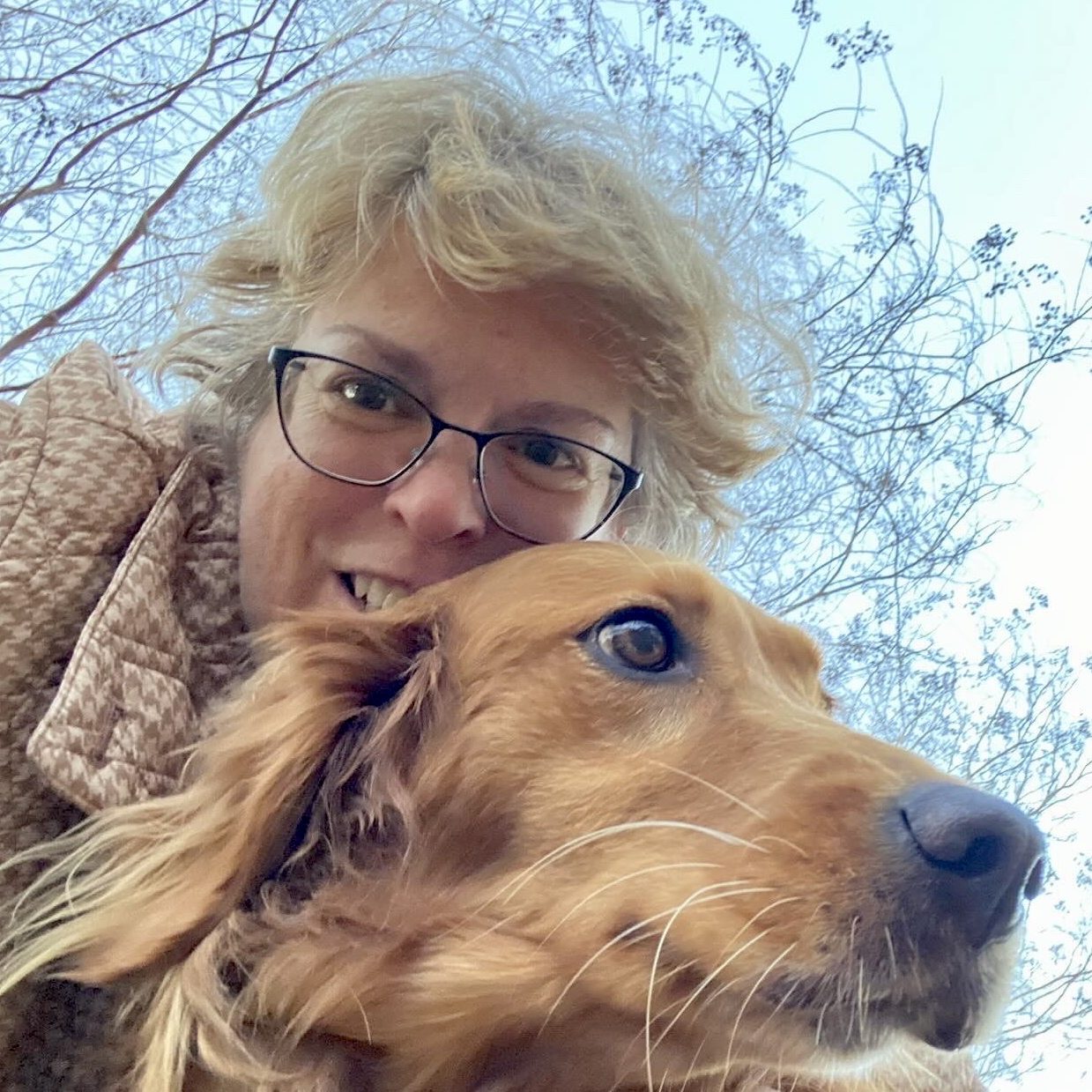
Formal bio:
Katherine (Katie) Riegel’s lyric memoir about her sister, Our Bodies Are Mostly Water, is forthcoming from Cornerstone Press in summer 2025. She’s also the author of the poetry books Love Songs from the End of the World (Main Street Rag Press, 2019), What the Mouth Was Made For (FutureCycle Press, 2013), and Castaway (FutureCycle Press, 2010); her prose poetry/creative nonfiction chapbook Letters to Colin Firth won the Sundress Press chapbook competition in 2015. Her work has appeared in Brevity, Cream City Review, The Gettysburg Review, The Offing, One, Orion, Poets.org, SWWIM, Tin House, and many other literary publications. After receiving an MFA in poetry from the Iowa Writers Workshop, she taught writing at various colleges and universities for almost 25 years, most recently the University of South Florida. She is co-founder and managing editor of the literary magazine Sweet (sweetlit.org) and teaches online classes in poetry and creative nonfiction. Having recently completed a professional course to become a creative grief support practitioner, she now offers workshops and one-on-one mentoring aimed at helping people express, process, and transform their grief.
My story
I was lucky enough to grow up on a small Morgan horse farm in central Illinois. My father worked at the University of Illinois, and my mother raised us, trained the horses, gave riding lessons, and took us to horse shows. I rode before I could walk; when my mom took me to the doctor after I’d stopped trying to walk, he said, “A fall from a rocking horse shouldn’t affect her like that.” I wish I could go back in time to see the expression on his face when she admitted it was a real horse.
We moved from the farm into the “big town” of Champaign-Urbana when I was 10, selling the horses and confining ourselves to a house on a normal-sized lot in a new development, and that was my first big loss, one that comes up in my writing again and again. Like many, I hated middle school and high school, but loved college: a community where ideas and creativity and learning were valued! I never wanted to leave it, and so I didn’t, really–a semester of law school was enough to help me know what I really wanted, and so I went off to get my MFA and become a professor.
At the end of that semester of law school, I caught a bad flu, and subsequently developed all sorts of symptoms. The worst was fatigue, which stole from me the sports I played for fun–softball, volleyball, racquetball–as well as riding my bike on the country roads just beyond campus or walking any distance at all. Eventually I was diagnosed with Chronic Fatigue Syndrome, now known as ME/CFS. The symptoms of that condition waxed and waned, with new ones popping up occasionally. I’ve tried to write about it, but the experience of chronic illness feels both exhausting and dull. I’ve also discovered over time that I’m not even close to being “special” in this regard–so many folks live with physical and mental health issues, many of which are invisible–and unfortunately there are millions more now, dealing with long COVID.
But the pandemic gave me one gift: reliable videoconferencing technology. And so I was able to offer workshops that felt almost like the in-person classes I’d missed so desperately after I left teaching. I’d been offering asynchronous classes for years, but I truly love the community of a group of people talking about each other’s writing, their insights and observations sparking my own.
My approach
I believe writing poems and essays should be playful, joyful, an act of discovery, a commitment to the hard work of challenging ourselves to articulate our strange, wonderful, tragic, surprising human experiences. When we write the thing that only we could write–one individual born in a particular time, to a specific family, in a particular place, who happened to interact with certain teachers and have unique experiences–then we’re well on the way to producing interesting work. But I also think we need to push language to express what seems ineffable, and push ourselves to see beyond our first ideas. Good writing helps us see the world afresh, makes the ordinary weird, offers a glimpse of what being a human on this paradoxically beautiful, terrible world means.
So in the classes I facilitate, both synchronous and asynchronous, and when I work with writers individually, I try to respond in ways that recognize what a piece is trying to do, what it’s doing well, and how the writer might get closer to their goal. My journey as a teacher and writer has helped me realize that I really want to respond in a way that makes the writer want to write the next poem or essay, and the next. I don’t always get it right, but my goal is support and encouragement, not criticism. And I truly believe it is a more intellectually rigorous activity to describe the tools a writer is using and how those strategies affect you as a reader than to only suggest changes.
In short, I don’t subscribe to literary elitism–history has shown us that writing praised in its time doesn’t always retain popularity or acclaim–but I do believe the writer benefits from avoiding cliche, reading widely to figure out what they love and admire, learning and practicing with a writer’s tools, and trying out new strategies. We write because it helps us to become, to understand, and to reach out across the chasms within and between us.

Some people react physically to the magic of poetry, to the moments, that is, of authentic revelation, of the communication, the sharing, at its highest level…A good poem is a contribution to reality. The world is never the same once a good poem has been added to it. A good poem helps to change the shape and significance of the universe, helps to extend everyone’s knowledge of [themself] and the world around [them].
— Dylan Thomas